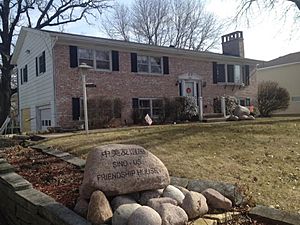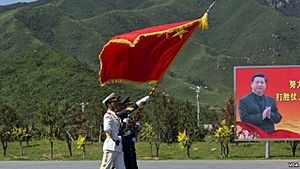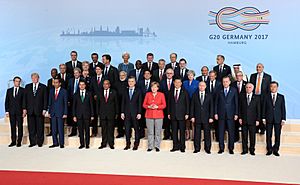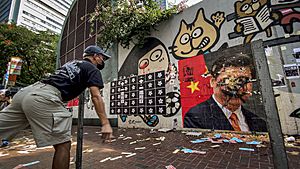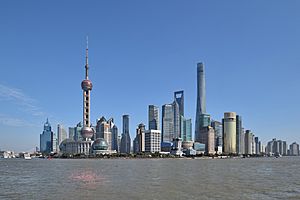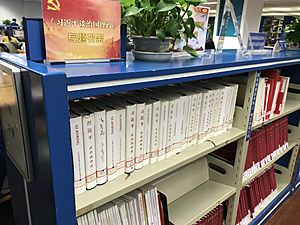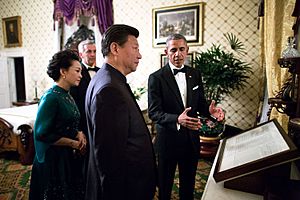Xi Jinping facts for kids
Quick facts for kids
Xi Jinping
|
|||||||||||||||||||||||||||||||||||||||||||||
|---|---|---|---|---|---|---|---|---|---|---|---|---|---|---|---|---|---|---|---|---|---|---|---|---|---|---|---|---|---|---|---|---|---|---|---|---|---|---|---|---|---|---|---|---|---|
|
习近平
|
|||||||||||||||||||||||||||||||||||||||||||||
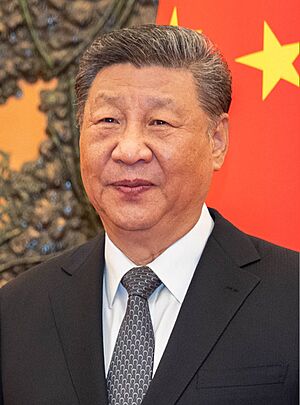
Xi in 2025
|
|||||||||||||||||||||||||||||||||||||||||||||
| General Secretary of the Chinese Communist Party | |||||||||||||||||||||||||||||||||||||||||||||
| Assumed office 15 November 2012 |
|||||||||||||||||||||||||||||||||||||||||||||
| Preceded by | Hu Jintao | ||||||||||||||||||||||||||||||||||||||||||||
| President of China | |||||||||||||||||||||||||||||||||||||||||||||
| Assumed office 14 March 2013 |
|||||||||||||||||||||||||||||||||||||||||||||
| Premier | |||||||||||||||||||||||||||||||||||||||||||||
| Vice President |
|
||||||||||||||||||||||||||||||||||||||||||||
| Preceded by | Hu Jintao | ||||||||||||||||||||||||||||||||||||||||||||
| Chairman of the Central Military Commission | |||||||||||||||||||||||||||||||||||||||||||||
Assumed office
|
|||||||||||||||||||||||||||||||||||||||||||||
| Deputy |
|
||||||||||||||||||||||||||||||||||||||||||||
| Preceded by | Hu Jintao | ||||||||||||||||||||||||||||||||||||||||||||
| Vice Chairman of the Central Military Commission | |||||||||||||||||||||||||||||||||||||||||||||
In office
Serving with Guo Boxiong & Xu Caihou
|
|||||||||||||||||||||||||||||||||||||||||||||
| Chairman | Hu Jintao | ||||||||||||||||||||||||||||||||||||||||||||
| Vice President of China | |||||||||||||||||||||||||||||||||||||||||||||
| In office 15 March 2008 – 14 March 2013 |
|||||||||||||||||||||||||||||||||||||||||||||
| President | Hu Jintao | ||||||||||||||||||||||||||||||||||||||||||||
| Preceded by | Zeng Qinghong | ||||||||||||||||||||||||||||||||||||||||||||
| Succeeded by | Li Yuanchao | ||||||||||||||||||||||||||||||||||||||||||||
| Personal details | |||||||||||||||||||||||||||||||||||||||||||||
| Born | 15 June 1953 Beijing, China |
||||||||||||||||||||||||||||||||||||||||||||
| Political party | CCP (since 1974) | ||||||||||||||||||||||||||||||||||||||||||||
| Spouses |
|
||||||||||||||||||||||||||||||||||||||||||||
| Children | Xi Mingze | ||||||||||||||||||||||||||||||||||||||||||||
| Parents | |||||||||||||||||||||||||||||||||||||||||||||
| Relatives | Qi Qiaoqiao (sister) | ||||||||||||||||||||||||||||||||||||||||||||
| Residence | Zhongnanhai | ||||||||||||||||||||||||||||||||||||||||||||
| Education | Tsinghua University (BS, LLD) | ||||||||||||||||||||||||||||||||||||||||||||
| Awards | Full list | ||||||||||||||||||||||||||||||||||||||||||||
| Signature |  |
||||||||||||||||||||||||||||||||||||||||||||
| Scientific career | |||||||||||||||||||||||||||||||||||||||||||||
| Thesis | A Tentative Study on China's Rural Marketization (2001) | ||||||||||||||||||||||||||||||||||||||||||||
| Doctoral advisor | Liu Meixun (刘美珣) | ||||||||||||||||||||||||||||||||||||||||||||
| Chinese name | |||||||||||||||||||||||||||||||||||||||||||||
| Simplified Chinese | 习近平 | ||||||||||||||||||||||||||||||||||||||||||||
| Traditional Chinese | 習近平 | ||||||||||||||||||||||||||||||||||||||||||||
|
|||||||||||||||||||||||||||||||||||||||||||||
|
Central institution membership
2007–: 17th, 18th, 19th, 20th Politburo Standing Committee
2007–: 17th, 18th, 19th, 20th Politburo 2007–2012: Secretary (first-ranked), 17th Central Secretariat 2002–: Full member, 16th, 17th, 18th, 19th, 20th Central Committee 1997–2002: Alternate member, 15th Central Committee 1998–: Delegate, 9th, 10th, 11th, 12th, 13th, 14th National People's Congress Leading Groups and Commissions
2018–present: Director, Central Financial and Economic Affairs Commission
2018–present: Director, Central Foreign Affairs Commission 2018–2023: Director, Central Cyberspace Affairs Commission 2018–present: Director, Central Comprehensive Law-based Governance Commission 2018–present: Director, Central Comprehensively Deepening Reforms Commission 2014–present: Leader, Leading Group for Defence and Military Reform 2014–2018: Leader, Leading Group for Internet Security and Informatization 2013–present: Chairman, National Security Commission 2013–2018: Leader, Leading Group for Financial and Economic Affairs 2013–2018: Leader, Central Leading Group for Comprehensively Deepening Reforms 2012–present: Leader, Central Leading Group for Taiwan Affairs 2012–2018: Leader, Foreign Affairs Leading Group 2007–2012: Leader Group for Party Building c. 2007–2012: Leader, Leading Group for Activities of Deepening the Study and Practice of the Outlook of Scientific Development 2007–2012: Leader, Central Coordination Group for Hong Kong and Macau Affairs Other offices held
2016–present: Supreme Commander, Joint Battle Command of the People's Liberation Army
2010–2013: Vice Chairman, State Central Military Commission 2010–2012: Vice Chairman, Party Central Military Commission 2008–2013: Vice President of China 2007–2012: President, Central Party School 2007: Party Committee Secretary, Shanghai municipality 2002–2007: Party Secretary, Zhejiang province, director, Standing Committee of the Zhejiang Provincial People's Congress 2002: Deputy Party Secretary & acting governor, Zhejiang province 1999–2002: Governor, Fujian province 1995–2002: Deputy Party Secretary, Fujian province 1990–1996: Party Secretary, Fuzhou 1990–1996: Chairman, Standing Committee of the Fuzhou Municipal People's Congress 1988–1990: Party Secretary, Ningde 1985–1988: Deputy Mayor, Xiamen 1983–1985: Party Secretary, Zhengding County the People's Republic of China
|
|||||||||||||||||||||||||||||||||||||||||||||
Xi Jinping (born 15 June 1953) is a Chinese politician. He has been the top leader of China since 2012. This means he is the General Secretary of the Chinese Communist Party (CCP) and the chairman of China's military. Since 2013, Xi has also been the President of China. He is the first CCP leader born after the People's Republic of China was founded in 1949.
Xi's father was a Chinese communist leader. During the Cultural Revolution, his father faced difficulties, and Xi was sent to live in a rural area. He lived in a cave house in Liangjiahe village. There, he joined the CCP and worked as a local leader. After studying chemical engineering at Tsinghua University, Xi began to rise in politics. He worked in coastal provinces like Fujian and Zhejiang. In 2007, he became a member of the CCP's top leadership group, the Politburo Standing Committee. In 2008, he became the Vice President of China. He was seen as the next leader of China.
As China's leader, Xi has focused on making the country stronger. He started a big campaign against corruption. This campaign led to many officials being removed from their positions. He also introduced policies to help people become more prosperous and reduce poverty. He has supported state-owned businesses and focused on developing new technologies. During the COVID-19 pandemic, he led China's "zero-COVID" policy. This policy aimed to stop the virus from spreading.
In foreign policy, Xi has made China more assertive on the world stage. He has worked to expand China's influence globally, especially through projects like the Belt and Road Initiative. He has also focused on China's relationships with countries like the United States and those in Asia. Under his leadership, China has increased its military strength.
Since Xi became leader, there have been changes in China's society. Censorship and mass surveillance have increased. There have also been concerns about human rights, especially regarding ethnic minorities. In 2018, China's constitution was changed to remove term limits for the president. This allowed Xi to serve more than two terms. His political ideas, known as Xi Jinping Thought, are now part of China's official documents. In October 2022, Xi began his third term as the CCP General Secretary. He was re-elected as president in March 2023.
Contents
- Early Life and Education
- Early Political Career
- Becoming a Top Leader
- Xi Jinping's Leadership
- Political Ideas
- Personal Life
- See also
Early Life and Education
Xi Jinping was born in Beijing on 15 June 1953. He was the third child of Xi Zhongxun, a well-known communist leader. His father held important jobs after the People's Republic of China was founded in 1949. Xi had two older sisters.
Xi attended schools in Beijing in the 1960s. In 1963, when he was ten, his father faced political difficulties. His father was sent to work in a factory. In 1966, the Cultural Revolution began. This period stopped many students from going to school. Xi's family home was searched, and one of his sisters died due to the events of that time.
His mother was forced to speak against his father in public. His father was later put in prison in 1968. In 1968, Xi decided to leave Beijing for the countryside. On 13 January 1969, he arrived in Liangjiahe Village in Shaanxi province. This was part of a movement where young people were sent to rural areas. Life in Liangjiahe was very different from Beijing. Xi had to get used to many challenges, like dealing with fleas, finding enough food, and doing hard labor. This experience helped him understand the lives of poor farmers.
After a few months, he tried to return to Beijing but was arrested. He was sent to a work camp. He later went back to Liangjiahe. He became the local party secretary there. He lived in a yaodong, which is a type of cave house.
Xi spent seven years in the countryside. In 1973, he was assigned to another village to help with social education. He worked well with the villagers. He applied to join the Chinese Communist Party many times. His father's political problems made it difficult. But in early 1974, his application was finally approved. He then became the Party branch chairman of Liangjiahe.
After becoming a leader, Xi learned about biogas technology from another region. He brought this idea back to Liangjiahe. This helped solve fuel shortages in his village. He also led projects to dig wells for water, start small industries, and plant tobacco. In 1975, he was recommended for Tsinghua University. From 1975 to 1979, he studied chemical engineering there.
Early Political Career
Starting in Government
After graduating in 1979, Xi worked in government offices. He served as a secretary to Geng Biao, who was then the Minister of Defense.
Working in Hebei
In 1982, Xi became a deputy party secretary in Zhengding County, Hebei province. He worked with another leader to write a letter to the central government. They wanted to reduce the amount of crops farmers had to give to the government. Their efforts helped farmers earn more money.
As the party secretary of Zhengding County in 1983, Xi started many projects. He worked on developing local talents and building parks. He also helped restore a famous temple. He brought in a TV production company to film a show in Zhengding. This helped boost tourism and brought in a lot of money for the county. In 1985, Xi visited Iowa, USA, to learn about farming. After this trip, he was moved to Xiamen in Fujian province.
Leadership in Fujian
Xi arrived in Xiamen in 1985. He helped create the city's first long-term development plan. He also worked on projects like preparing for Xiamen Airlines and improving roads. He married Peng Liyuan while in Xiamen.
In 1988, he became the party secretary of Ningde. This area was not as developed as other parts of Fujian. Xi worked on reducing poverty and strengthening the local CCP. He wrote a book about his experiences there called Getting out of Poverty. In 1990, he became the Municipal Committee Secretary of Fuzhou City.
In 1997, he became an alternate member of the 15th CCP Central Committee. He was promoted to Vice Governor of Fujian in 1999 and then governor in 2000. He focused on attracting investment and developing industries. He also worked on improving city areas and helping people on Pingtan Island escape poverty. He oversaw the development of "Digital Fujian," which improved government services.
Leading in Zhejiang
In 2002, Xi moved to Zhejiang province. He became the provincial Party Committee secretary. This was his first time holding a top provincial job. In 2002, he became a full member of the 16th Central Committee. This marked his move to the national political stage. While in Zhejiang, the economy grew quickly. Xi was known for being tough on corrupt officials. This gained him attention from China's top leaders.
Time in Shanghai
In 2007, Xi was transferred to Shanghai to become the party secretary. He served there for seven months. In Shanghai, Xi focused on keeping the local party united. He avoided controversy and followed party rules strictly. He reportedly refused to take a special train for himself, saying it was only for "national leaders."
Becoming a Top Leader
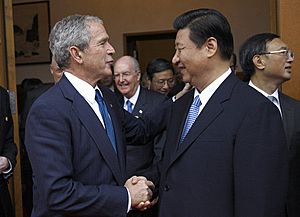
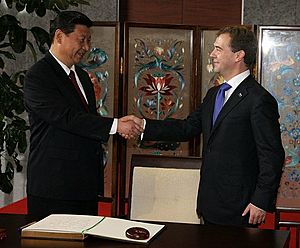
In October 2007, Xi was appointed to the nine-member Politburo Standing Committee (PSC). This showed he was likely to become China's next leader. In March 2008, he was elected Vice President of China. After this, Xi took on many important tasks. He helped prepare for the 2008 Summer Olympics in Beijing. He also became the main government figure for Hong Kong and Macau affairs. He visited disaster areas after the 2008 Sichuan earthquake. His first foreign trip as vice president was to North Korea and other countries in June 2008.
Xi's path to becoming the top leader seemed clear. However, another politician, Bo Xilai, was rising quickly. Many thought Bo might challenge Xi. But Bo's political career ended due to a scandal. This cleared the way for Xi to become the leader without major challengers.
People who knew Xi described him as thoughtful and stable. Former Singaporean Prime Minister Lee Kuan Yew compared him to Nelson Mandela. He said Xi was a person with "enormous emotional stability." Former U.S. Treasury Secretary Henry Paulson said Xi "knows how to get things over the goal line."
Trips as Vice President
In February 2009, Xi traveled to Latin America. He visited Mexico, Jamaica, Colombia, Venezuela, Brazil, and Malta. In Mexico, he spoke about China's role during the global financial crisis. He said China's ability to feed its large population was a great contribution to humanity. He also said that China does not "export revolution" or "hunger and poverty."
In October 2009, he visited several European countries. In December 2009, he visited Japan, South Korea, Cambodia, and Myanmar. In February 2012, he visited the United States, Ireland, and Turkey. In the U.S., he met with President Barack Obama and Vice President Joe Biden. He also visited Iowa, where he met the family who hosted him during his 1985 trip.
Becoming China's Top Leader
On 15 November 2012, Xi was elected as the General Secretary of the CCP. He also became the chairman of the military commission. This made him the formal leader of the CCP and the informal top leader of China. He was the first top leader born after the founding of the People's Republic of China. The next day, he introduced the new members of the Politburo Standing Committee.
In his first speech as General Secretary, Xi spoke simply. He talked about what ordinary people hoped for. He mentioned "better education, more stable jobs, better income, more reliable social security, medical care of a higher standard, more comfortable living conditions, and a more beautiful environment." He also promised to fight corruption.
In December 2012, Xi visited Guangdong. This was his first trip outside Beijing as General Secretary. He called for more economic reforms and a stronger military. His trip was seen as following in the footsteps of Deng Xiaoping, who also made an important trip to the south. Xi often spoke about the "Chinese Dream" during this trip. He said it was a dream of a strong nation and a strong military.
Xi was elected President of China on 14 March 2013. He received almost all votes from the 12th National People's Congress. He replaced Hu Jintao, who retired. Soon after his election, Xi discussed cybersecurity and North Korea with U.S. President Barack Obama.
Xi Jinping's Leadership
Strengthening Power
Many experts say Xi is the most powerful Chinese leader since Mao Zedong. He has brought more power to himself. He created special working groups that he leads. This helps him make decisions more directly.
In 2018, China's constitution was changed. This removed the term limits for the president and vice president. This meant Xi could serve more than two terms as president. He was reappointed as president, and Li Keqiang was reappointed premier. Xi explained that this change was to match his other powerful roles, which do not have term limits.
In November 2021, the CCP passed a "historical resolution." This document looked back at the party's history. It was only the third such document in the party's history. This resolution further strengthened Xi's position. In October 2022, Xi was re-elected as General Secretary for a third term. This made him the first party leader since Mao Zedong to serve a third term. The new Politburo Standing Committee, chosen after the Congress, included many people close to Xi. In March 2023, Xi was again re-elected as president.
Focus on Anti-Corruption
Xi promised to fight corruption as soon as he became leader. He said corruption was a big challenge for the party. He introduced rules to stop corruption and waste among officials. He vowed to go after both high-ranking officials ("tigers") and lower-level officials ("flies").
His campaign led to many important officials being investigated and removed. This included former military leaders and top security officials. Special teams were sent out to check on party organizations across the country. These teams helped find and investigate corrupt officials. Within the first two years, over 200,000 officials received warnings or punishments.
Some critics say the anti-corruption campaign was also used to remove political opponents. Xi created a new anti-corruption agency, the National Supervision Commission. This agency is very powerful. By 2023, about 2.3 million government officials had been investigated.
Controlling Information
Since Xi became General Secretary, censorship has increased. He stated that state media must support the party's views. His government has put more restrictions on the internet. He believes in "internet sovereignty," meaning each country should control its own internet. For example, all versions of Wikipedia were blocked in China in April 2019.
A law passed in 2013 allowed prison terms for bloggers who shared "defamatory" content too many times. Many bloggers stopped writing about sensitive topics.
Economy and Technology
Xi was first seen as someone who would bring more market reforms. His government said that market forces would play a "decisive" role in the economy. This meant reducing government involvement in some areas. He launched the Shanghai Free-Trade Zone in 2013. However, some experts said reforms slowed down by 2017.
China's economy has grown significantly under Xi. Its size doubled from 2012 to 2023. Xi has emphasized "high-quality growth" over just fast growth. He said other issues like environmental protection are important. He made ending extreme poverty a key goal. By 2021, he declared a "complete victory" over extreme poverty.
Xi has also focused on developing advanced manufacturing and technology. He promoted the "Made in China 2025" plan. This plan aims to make China self-reliant in key technologies. Spending on research and development has greatly increased. China has made big advances in areas like electric vehicles and solar panels.
Since 2021, Xi has promoted "common prosperity." This means wealth for everyone, not just a few. This idea has led to new rules for large tech companies and tutoring industries. China also introduced strict rules for private tutoring companies.
Government Reforms
In November 2013, the Communist Party announced big reforms. These included changes to economic and social policies. Xi also created a new National Security Commission. This helped him take more control over national security.
Another group, the Central Leading Group for Comprehensively Deepening Reforms, was formed. This group, also led by Xi, oversees the reforms. These reforms were seen as very important. The party also decided to end the "re-education through labor" system. This system had faced much criticism. In 2016, China replaced the one-child policy with a two-child policy. In 2021, all family size limits were removed.
Military Changes
Since 2012, Xi has worked to modernize China's military, the People's Liberation Army. He has taken a direct role in military reform. He has emphasized that the party must have "absolute control over the army."
In 2015, Xi announced a reduction of 300,000 troops. This brought the army's size to 2 million. In 2016, he changed the military's command structure. He reduced the number of large military regions and created new agencies that report directly to the military commission. He also created two new branches of the army.
In 2016, Xi was named commander-in-chief of the country's new Joint Operations Command Center. This showed his strong leadership. China's military budget has more than doubled under Xi. The PLA Navy has grown quickly. China has also expanded its nuclear weapons.
Foreign Relations
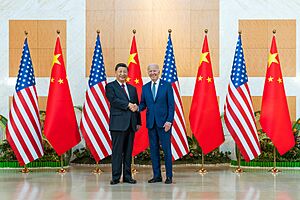
Xi has taken a stronger stance on foreign affairs. He wants China to be a major global power. He believes China should be confident in its own values. Xi has promoted "major-country diplomacy." This means China acts more boldly on the world stage. His foreign policy ideas are called "Xi Jinping Thought on Diplomacy."
He has said that "the East is rising and the West is declining." He believes the Western world is facing challenges. Xi has also talked about building a "community with a shared future for mankind." This suggests China wants a new global order.
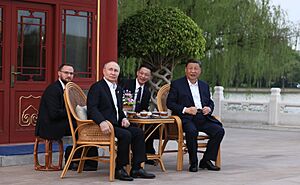
Xi has focused on increasing China's "international discourse power." This means telling China's story better to the world. He has also launched global initiatives for development, security, and civilization.
Relations with Other Countries
- Africa: China has good relationships with most African countries. Xi has promised to help some African countries with their debts.
- Asia: Relations with North Korea have improved since 2018. China and South Korea signed a free-trade agreement in 2015. Relations with Japan have had ups and downs due to island disputes. China has built and militarized islands in the South China Sea. Relations with India have faced challenges, including border disputes. Xi has also worked to strengthen ties with countries in the Middle East.
- Europe: China wants the European Union to remain neutral in its relations with the U.S. Xi has built stronger ties with Russia, especially since 2014. During the Russian invasion of Ukraine, Xi expressed support for Russia on some issues.
- United States: Xi has called for a "new type of great-power relations" with the U.S. Relations became more difficult after 2017, leading to a trade war.
National Security Focus
Xi has put a lot of effort into national security. He calls for a "holistic national security architecture." This means security in all parts of the country and party. He introduced this idea in 2014. It includes political, economic, military, and cultural security.
His government has passed many laws related to national security. These include laws on counterespionage, counterterrorism, and cybersecurity. China's mass surveillance network has grown significantly under Xi.
Hong Kong Policies
Under Xi's leadership, China has worked to integrate Hong Kong more closely with mainland China. This includes projects like the Hong Kong–Zhuhai–Macau Bridge. These efforts have led to concerns about reduced freedoms in Hong Kong.
In 2014, China's government stated it had "comprehensive jurisdiction" over Hong Kong. In 2020, a national security law was passed in Hong Kong. This law greatly increased government control over political opposition. It was seen as a way to bring Hong Kong closer to the mainland. Xi visited Hong Kong in 2017 and 2022 for important anniversaries.
Taiwan Relations
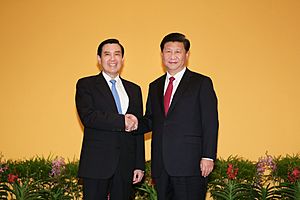
In November 2015, Xi met with then-Taiwanese president Ma Ying-jeou. This was the first meeting between leaders from both sides since 1950. Xi said that China and Taiwan are "one family." However, relations became more difficult after Tsai Ing-wen became Taiwan's president in 2016.
In 2017, Xi used stronger language about potential Taiwan independence. He said China would "never allow any person, any organisation, or any political party to split any part of the Chinese territory from China." In January 2019, he said China would not promise to avoid using force to achieve unification.
Human Rights Concerns
Since Xi became leader, there have been concerns about human rights in China. Some groups say that the situation has worsened. There have been crackdowns on activists and lawyers.
In some areas, there have been reports of policies affecting religious groups. For example, in Jiangxi province, some Christians were told to replace pictures of Jesus with pictures of Xi Jinping.
Policies towards ethnic minorities have also changed. The government has focused on assimilation. In Xinjiang, following several attacks, Xi launched a campaign in 2014. This campaign involved mass detentions and surveillance of ethnic Uyghurs. Many people were held in internment camps. Human rights groups have described these camps as places where Uyghurs and other minorities are forced to adopt Han Chinese culture. Some international reports have raised concerns about these actions.
Xi has visited Xinjiang multiple times. He has urged local officials to listen to people and preserve ethnic minority culture. He also said the region should open up more for tourism.
COVID-19 Pandemic Response
On 20 January 2020, Xi first spoke about the emerging COVID-19 pandemic in Wuhan. He ordered efforts to stop the virus from spreading. The government responded with lockdowns and censorship. He met with the head of the World Health Organization (WHO) on 28 January.
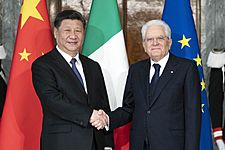
After controlling the outbreak in Wuhan, Xi supported a "dynamic zero-COVID policy." This policy aimed to control the virus as much as possible within China. It involved local lockdowns and mass testing. This approach was initially praised but later criticized for its impact on the economy and people's lives. A strict lockdown in Shanghai in 2022 caused difficulties for millions.
At the 20th CCP Congress in October 2022, Xi confirmed the continuation of the zero-COVID policy. However, protests against the policy broke out in November 2022. These protests occurred in many major cities. The government then eased COVID-19 restrictions in December 2022.
Environmental Policies
Xi sees environmental protection as a top priority for China. He uses the metaphor of "two mountains." This means that while mountains of gold and silver are valuable, "green mountains with clear waters are more valuable." This slogan means that economic growth must also protect the environment.
In September 2020, Xi announced that China would aim to reach carbon neutrality before 2060. This goal would significantly help reduce global temperature rise. He also said China would not build new coal power projects abroad.
Leadership Style
Xi is known for being a very private leader. Not much is publicly known about how he makes political decisions. His speeches are often released months after he gives them. He rarely holds press conferences. Reports suggest Xi prefers to be very involved in the details of governance. He reportedly reviews every major policy document himself.
Xi emphasizes certain rules for Communist Party members. He calls for them to be humble and hardworking. He also encourages "self-criticism." This is meant to make officials seem less corrupt and more popular.
Political Ideas
The Chinese Dream
Xi and CCP thinkers created the phrase "Chinese Dream." This describes his big plans for China. Xi first used this phrase in November 2012. It has since become his main political slogan. The "Chinese Dream" is linked to the idea of the "great rejuvenation of the Chinese nation." It is about China becoming strong and prosperous.
Culture and Values
Xi has supported the return of ancient Chinese ideas, like Confucianism. He has said that the Western world is facing a "crisis of confidence." He believes the CCP is a "loyal inheritor and promoter of China's outstanding traditional culture."
Xi's leadership has also seen a rise in the ancient philosophy of Legalism. He has quoted thinkers like Han Fei. He has also supported the philosopher Wang Yangming. Xi has called for a "new marriage and childbirth culture."
He has emphasized using "red resources," which means remembering the history of the Communist Party. He believes art should serve political goals and national rejuvenation. He has also overseen a revival of traditional Chinese culture. He calls it the "soul" of the nation. He has established "four matters of confidence" for Chinese people. These are confidence in China's path, theories, political system, and culture.
Ideology and Governance
Xi has stated that "only socialism can save China." He believes that socialism with Chinese characteristics is the right path for China's future. Some observers see Xi as a strong believer in communist ideas. He has emphasized that the Communist Party's goal is to achieve communism.
Xi believes that "capitalism is bound to die out and socialism bound to win." He has increased the study of "Socialist Political Economy With Chinese Characteristics" in China. He has also said that "the party leads them all," meaning the CCP leads all parts of government, military, and society.
He has stated that "without the Communist Party of China, there would be no new China." He believes the party's leadership is China's greatest strength. However, he also warns that the party must be careful to avoid collapse. Xi has spoken against "historical nihilism," which means challenging the party's official view of history.
Xi has rejected a multi-party system for China. He believes China's "socialist democracy is the most comprehensive, genuine and effective democracy." This idea is different from Western democracies. He has also promoted "Chinese-style modernization," which he says is different from Western ways of modernizing.
Xi Jinping Thought
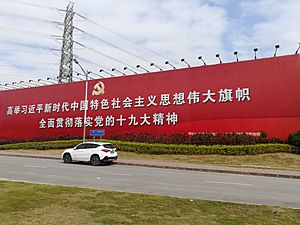
In September 2017, the CCP decided that Xi's political ideas would become part of the Party Constitution. These ideas are called "Xi Jinping Thought on Socialism with Chinese Characteristics for a New Era." In March 2018, China's state constitution was also changed to include this thought.
Xi describes his thought as part of the larger framework of socialism with Chinese characteristics. This framework was started by Deng Xiaoping. Official documents say Xi Jinping Thought continues the ideas of Marxism–Leninism and previous Chinese leaders. It is sometimes called "21st century Marxism." The ideas are explained in Xi's book series, The Governance of China. An app called Xuexi Qiangguo was launched in 2019 to help people learn about Xi Jinping Thought.
Personal Life
Family Life
Xi's first marriage was to Ke Lingling. They divorced after a few years. In 1987, Xi married Peng Liyuan, a famous Chinese folk singer. Peng was more famous than Xi until he became a top political leader. She has taken on a more public role as China's "first lady" than previous leaders' wives. For example, she hosted U.S. First Lady Michelle Obama in 2014.
Xi and Peng have a daughter named Xi Mingze. She graduated from Harvard University in 2015. She used a different name while studying there.
Personality and Interests
Peng Liyuan has described Xi as hardworking and down-to-earth. She said that at home, he is "just my husband." Journalists who met him in the past described him as confident and relaxed. He was seen as practical, serious, and hardworking. Chinese state media often shows him as a caring leader who stands up for China.
Xi is a big fan of soccer. He has a vision to make China a soccer superpower. He wants China to qualify for the World Cup, host a World Cup, and eventually win one. In 2015, he approved a plan to include soccer in school and build many soccer schools.
Unlike previous leaders, more is known about Xi's private life, though it is still carefully managed. He reportedly swims and walks every day. He enjoys foreign writers, especially Russian authors like Leo Tolstoy. He also likes films and TV shows such as Saving Private Ryan and The Godfather.
See also
 In Spanish: Xi Jinping para niños
In Spanish: Xi Jinping para niños
 | Shirley Ann Jackson |
 | Garett Morgan |
 | J. Ernest Wilkins Jr. |
 | Elijah McCoy |


